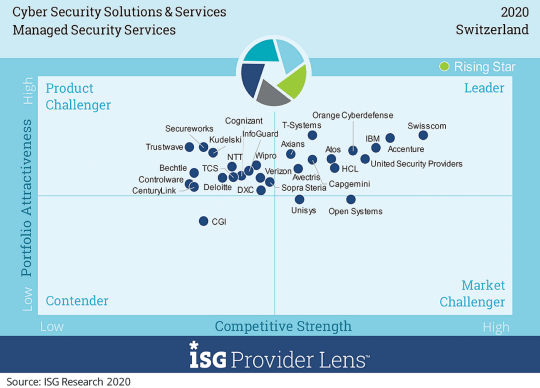Study: ISG Provider Lens 2020
Cyber security services are in high demand – Swisscom is leading the way
Increasingly complex cyber attacks are just one of the reasons why companies are looking to cyber security services. The study by ISG Provider Lens analysed current trends and Swiss security service providers, and positioned Swisscom as the leading provider of managed security services in Switzerland.
Text: Andreas Heer, image: Adobe Stock
A total of 20,000 security breaches were reported to the FBI in the first half of 2020. This is as many breaches as were reported in all of 2019. The COVID-19 pandemic has resulted in a noticeable increase in cyber attacks. This has also translated to more reports being made to the Swiss National Cyber Security Centre (NCSC, formerly MELANI). The NCSC registered just under 400 incidents at the high point of the pandemic, three times as many as at the beginning of the year.
And as if more proof were needed that IT security will continue to be an important topic for companies, the notorious Emotet Trojan became active again in mid-July. These are developments that could cause serious headaches for IT security officers. After all, not only is the number of attacks on the rise, but the attacks themselves are growing increasingly sophisticated. CIOs and CISOs are faced with the task of endlessly adapting their companies’ IT security measures in an attempt to counteract the continually evolving attack patterns. A process that according to the authors of the study ‘ISG Provider Lens: Cyber Security Solutions & Services’ is made more difficult by the fight for a share of tight investment budgets.
Boom in managed security services
The current situation favours the outsourcing of IT security work to cyber security service providers. After all, managed security services (MSS) are calculable and do not require costly investment in IT security equipment or a search for qualified specialists, who are few and far between.
In the latest Provider Lens study ‘Cyber Security Solutions & Services’, the international technology research and consulting firm Information Services Group (ISG) compared providers in Switzerland. The criteria included market relevance, portfolio attractiveness, strategy, vision and innovative strength. As was the case in the last study of this kind four years ago, the authors ranked Swisscom as the leading provider of MSS in Switzerland. In addition to a comprehensive range of services, the study also emphasised Swisscom’s proximity to its customers; for example, through its Security Operation Centre (SOC) in Switzerland. According to the authors: ‘Together with its subsidiary United Security Providers, Swisscom has created the largest cyber security competence cluster in Switzerland.’

In addition to the comprehensive MSS, the study also analysed technical services, such as integration and maintenance, and strategic consulting offers. The study considered providers that do not focus solely on their own products and which offer ‘best-of-breed’ solutions. The authors confirmed that Swisscom offers a comprehensive range of products and services and an in-depth understanding of Swiss companies. These factors contributed to the study positioning Swisscom as the leader on the Swiss market in both ‘Strategic Security Services’ and ‘Technical Security Services’.
SOCs in Switzerland offer an advantage
As data protection requirements become stricter as the result of the GDPR, the location of a SOC becomes more important. After all, a company must be able to ensure that the relevant legal requirements are met. Companies subject to the current regulations are not the only ones that benefit from a location in Switzerland. International companies can also benefit from this factor; for example, when they are active in both Switzerland and the EU. This is also true for larger SMEs for which, according to the study, MSS are becoming increasingly attractive.
However, the study also says that MSS providers need to stay innovative in order to master the growing complexity of the attacks. And with a helping hand from a ‘digital friend’: in future, artificial intelligence at the cyber defence centre will make it easier to identify cyber attacks – come what may.
More on the topic:
